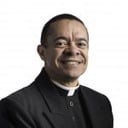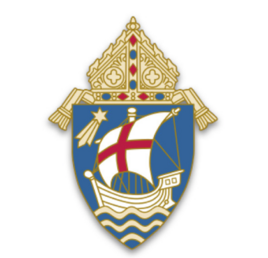-
-
Canonical Affairs & Tribunal
 The Office of Canonical Affairs and Tribunal is established as the judicial arm of the bishop's governance. We seek to apply justice tempered with mercy and bring resolution to legal questions from the activity of the Church and of the faithful.
The Office of Canonical Affairs and Tribunal is established as the judicial arm of the bishop's governance. We seek to apply justice tempered with mercy and bring resolution to legal questions from the activity of the Church and of the faithful.
This Office assists all departments, parishes, schools, and the bishop with canon law questions and ecclesial legal needs. If you are about to begin or you are in the middle of an annulment case, please work with your local Advocate (priest, deacon, or authorized minister) to make any inquiry to Canonical Affairs or the Tribunal. You might also find the Document & Resources section below especially helpful.
-
-
-
-
In every Diocese, the Bishop leads his community by three munera related to the priestly, prophetic and kingly functions of Christ. In English speaking countries we may see these functions as relating to sanctifying, teaching, legislative and judicial aspects necessary to effectively lead and manage a Diocese. When questions or concerns arise in families about the Church, the first place many look to for answers is the Bishop, his Curia and other consultants.In the early days of the Church all of a community's decisions, direction, and difficulties (often as much civil as religious) were handled by the Bishops, alone or in consultation with other Bishops. As the Church grew and governance became more complex, it became more difficult for the Bishop to single-handedly deal with all of the different issues confronting him. To assist the Bishop in certain areas, experts in the law were gathered around as consulters. Eventually, these experts were established in courts, or Tribunals, and were delegated the power to make some of the judgments and decisions on behalf of the Bishops.
-
-
-
Today Canonical Affairs and the Tribunal are considered the "ecclesiastical legal branch" of the Diocese. It deals with many different aspects of Church life, and relates to many of the different functions exercised by the Bishop. It is necessary for those working in the Tribunal to be expert in Canon Law and other laws of the Church. In the past, the only people approved to act in this capacity were priests. More recently lay people have been permitted to participate in this area of the Church.Although the most visible and time consuming area of the Tribunal deals with the annulment of failed marriages, many other areas also exist. As a canon lawyer for the Church one must be knowledgeable in all aspects of church law. There are issues such as intention of donors and understanding wills; rules for religious life; policies and regulations for Catholic institutions such as schools and hospitals; the temporal goods of the Church; penal laws for the clergy, the laity and members of religious communities; the reception of and formation for receiving the sacraments; and the ecumenical and religious dialogue with other religious groups.All in all, the Tribunal touches on a wide range of issues that affect all families in the Church. In the Diocese of Salt Lake City, when looking for direction or answers about aspects of the Church's life, a good place to start is the Chancery and Tribunal office. While it may not be possible to provide all the answers sought by an individual, it is a good beginning.
-
-
-
Canonical Affairs
Documents & ResourcesMarriage Documents
- Prenuptial Questionnaire
Cuestionario Prematrimonial - Affidavit of Marriage Freedom
Certificado de Soltera - Marriage Dispensation
Dispensa Matrimonial - Testimonial Letter for marriages to be celebrated outside of the Diocese
Petición de Carta Testimonial para bodas fuera de la Diócesis
Annulment & Dissolution Documents
- General Information Regarding Annulments in the Catholic Church and Canonical Procedures in the Diocese of Salt Lake City
Información general sobre las anulaciones en la Iglesia católica y los procedimientos canónicos en la diócesis de Salt Lake City - Lack of Form Application
Formulario Para Nulidad - Matrimonio Civil - Formal Case Application
Procedimiento en los Casos Formales de Nulidad Matrimonial - Ligamen Case
- Ligamen Petition I & Questionnaire on the Part of the RESPONDENT
Petición Ligamen I y cuestionario por parte del DEMANDADO - Ligamen Petition II & Questionnaire on the Part of the PETITIONER
Petición Ligamen II y cuestionario por parte del SOLICITANTE
- Ligamen Petition I & Questionnaire on the Part of the RESPONDENT
- Pauline Privilege Application & Questionnaire
Solicitud y cuestionario para el privilegio paulino - Petrine Privilege Application & Questionnaire
Solicitud y cuestionario para el privilegio petrino - Sanatio In Radice
Saneamiento Radical
Other Documents
- Tribunal Cases Checklist
Lista de verificación de casos judiciales - Diocesan Tribunal Policy on Canonical Procedures Applications for Declaration of Invalidity
Política del Tribunal Diocesano sobre Procedimientos Canónicos Solicitudes de Declaración de Nulidad
External Links
- Prenuptial Questionnaire
-
-
-
Canonical Affairs StaffThe bishop of each diocese appoints a Judicial Vicar to oversee the tribunal for the local Church. That is to say, to oversee the official court of the diocese. Just as with civil law, ecclesial law has various types of cases brought before the court, e.g. marriage cases, penal cases, and other contentious cases. The Judicial Vicar and his staff labor to bring justice and truth to bear, promote healing, and provide for dispensations and delegation of permissions in matters of canon law and governance throughout the diocese as an extension of the local bishop. Other positions within canonical affairs could include: Adjutant Judicial Vicar, Promoter of Justice, Defender of the Bond, Advocate, Tribunal Case Instructor/Auditor, Ecclesiastical Notary/Administrative Assistant, and various support staff.
-
-
-
-
-
 fr.silvadioslc.orgJudicial Vicar
fr.silvadioslc.orgJudicial Vicar -
 fr.oscar.marquinadioslc.orgAssistant to the Judicial Vicar and Parochial Vicar
fr.oscar.marquinadioslc.orgAssistant to the Judicial Vicar and Parochial Vicar -
 fr.andre.sicarddioslc.orgAssistant to the Judicial Vicar, Assistant Director of Vocations, and Parochial Vicar
fr.andre.sicarddioslc.orgAssistant to the Judicial Vicar, Assistant Director of Vocations, and Parochial Vicar -
 Terri Gioffreterri.gioffredioslc.orgSecretary for Canonical Affairs and Tribunal
Terri Gioffreterri.gioffredioslc.orgSecretary for Canonical Affairs and Tribunal
-
-
